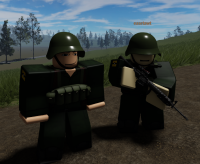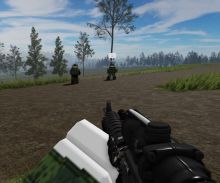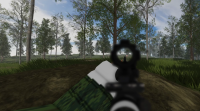Liberland Border Insurgency
index.php?title=Category:Wars index.php?title=Category:Conflicts
| |||||||||||||||||||||||||||||||||||||||||||
The Liberland Border Insurgency, also known as the Liberland Insurgency was a small conflict that took place in the far eastern part of Croatia. The war itself whilst short was extremely bloody and deadly for both sides. The insurgency only lasted for around two days in which more than 70 people died.
Prelude
The Liberlanders started an insurgency originally against the Serbian insurgents in the region, when the Croat's were able to push out the Serbians with the help of the Liberlanders, the two fell into conflict.
The insurgency
The insurgency started with Croat initial successes however those successes turned sour. The Liberlanders took advantage of the surrounding forest and hill lines and quickly descended into guerrilla warfare. The Croats seeing this had to resort to long range combat and bloody close-quarters combat. It became akin to Vietnam where the insurgents would hide in the thick vegetation, do surprise attacks then retreat. Eventually the Croat forces were able to circumvent these guerrilla tactics by performing counter flank attacks, in which one soldier would pin and the other would attack on a hard flag and give two directional fire which would be extremely successful.
In the final Croat push the Croatians ultimately destroyed all resistance with this flanking attack. The Liberlanders revolt was crushed and Croatia re-occupied the land.
The uprising
Unfavoured with the result of the insurgency, Aminut the leader of Liberland launched an uprising. The Liberlanders were successful, pushing Croats back and being able to raid a stockpile and equip themselves with M16s

The Liberlanders scored victories against the Croats for a good while until Croat forces were reinforced, the Croats were able to push the Liberlanders back and into the forests. During night a successful attack was launched which was only halted when the Liberlanders scored an ambush killing the Croatian soldiers. However, the war turned into a stalemate, the Croats had pushed into the forest but Liberlandish resistance was extremely strong and hard to counter. So on the 14th of January Croatia and Liberland agreed to stop fighting and sign a peace treaty recognising Liberland victory and independence.


There was multiple attacks from the Croat troops to try and regain lost territory before the peace treaty, all failed. The Liberlandish troops were able to maintain a defensive position.
The Peace Treaty
A peace treaty was signed on the 14th at 00:00 (British Standard Time). The peace was signed after a temporary ceasefire. Both sides agreed war was no longer worth it and the cost of lives had became too high. There terms were:
- Liberland gains independence, as a small microstate on the border with Croatia & Serbia.
- Liberland and Croatia sign a "Eternal Military Alliance", where both of them will help in any war they get into.
- Liberland and Croatia will make peace and improve relations.
Aftermath
After the war a new alliance was made, the "Eternal Military Alliance" which was a defensive pact aimed to combat growing aggression from eastern nations. It quickly grew to include the Celtic Union and The Kingdom of Corcaigh.
